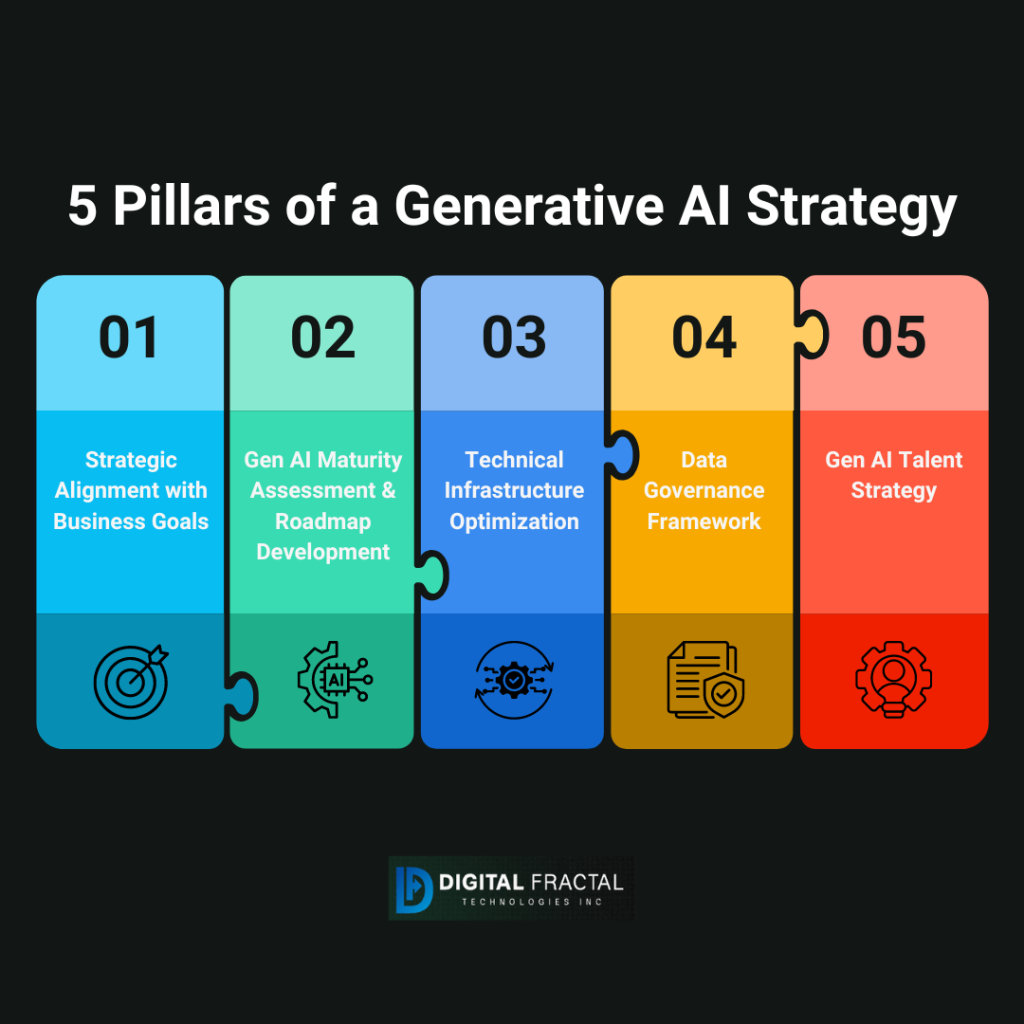Importance of Creating a Generative AI Strategy
By, Amy S
- 20 Jul, 2024
- 2.3k Views
- 0 Comment
Generative AI, with its ability to create entirely new content and data, is poised to fundamentally reshape how businesses operate. Studies by Global Data predict that the global Generative AI market was valued at $1.75 billion in 2022 and will grow at a compounded annual growth rate (CAGR) of 79.96% to reach a value of US$ 33.03 billion by 2027. But simply deploying generative AI tools isn’t enough. To truly capture the transformative power of this technology, businesses need a well-defined generative AI strategy.
This article dives deep into the importance of creating a generative AI strategy. We’ll explore how a strategic approach can unlock the true potential of generative AI, maximize its business value, and propel your company forward in this era of unprecedented technological advancement.
What is Generative AI?
Generative artificial intelligence, also known as Generative AI, refers to the subset of artificial intelligence technologies capable of generating new content — be it text, images, music, or even code. This technology leverages complex machine learning models, including deep learning neural networks, to understand patterns, relationships, and structures within large datasets. By digesting this vast amount of information, generative AI can produce novel creations that are often indistinguishable from those made by humans. It stands apart from other AI techniques with its unique ability to create rather than simply analyze or enhance existing content.
Why is Generative AI Important?
Why generative AI is important lies in its potential to revolutionize various industries by automating creative processes, enhancing productivity, and unlocking new business opportunities. From marketing to manufacturing, generative AI can innovate and streamline operations, making it a critical component of modern business strategies.
The Main Goal of Generative AI
Understanding what is the primary goal of a generative AI model is crucial for businesses looking to implement this technology. The primary goal of generative AI model is to generate new, original content that can add value to the business. This can range from creating marketing copy to designing new product prototypes, thus enhancing creativity and efficiency.
Developing an Effective Generative AI Strategy
Developing a generative strategy AI is not just about adopting new technology; it’s about aligning AI initiatives with your business’s core objectives and processes. This involves a comprehensive AI strategy framework that ensures generative AI acts as a catalyst for strategic advancement rather than just a novel tech trend.

Strategic Pillars of a Generative AI Strategy
To build an effective generative AI strategy, businesses should focus on the following strategy pillars:
- Strategic Alignment with Business Goals
- Ensure that your generative AI initiatives align with your business objectives.
- Identify specific use cases where generative AI will fuel business value if it is effectively implemented.
- What is the main focus of generative AI models? They should be used to enhance existing processes and create new opportunities for growth.
- Gen AI Maturity Assessment & Roadmap Development
- Assess your current data and AI maturity levels.
- Develop a roadmap for generative AI implementation that includes short-term and long-term goals.
- Technical Infrastructure Optimization
- Build a robust, scalable, and modular tech stack to support AI workloads.
- Ensure that your infrastructure can handle the demands of continuous model training and data processing.
- Data Governance Framework
- Establish 5 pillars of data governance framework to manage data quality, security, and compliance.
- Ensure ethical and responsible use of AI-generated data.
- Gen AI Talent Strategy
- Develop a strategy for attracting, training, and retaining talent skilled in generative-AI.
- Provide ongoing training to keep your team updated on the latest AI advancements.
How Generative AI Fits into Marketing Strategy
Integrating generative AI into your marketing strategy can revolutionize how you engage with customers. By leveraging AI to create personalized content, automate customer interactions, and analyze market trends, businesses can achieve higher efficiency and effectiveness in their marketing efforts. Understanding how generative AI fits into marketing strategy is crucial for maximizing its potential.
What Makes Generative AI Unique?
What makes generative AI unique is its ability to create entirely new content that can mimic human creativity. This capability sets it apart from other AI technologies that primarily focus on analysis and prediction. The uniqueness of generative AI allows businesses to innovate in ways that were previously unimaginable.
Importance of an AI Strategy Framework
An AI strategy framework provides a structured approach to integrating AI into your business. This framework helps in identifying the right AI tools, aligning them with business objectives, and ensuring effective implementation. Without a well-defined AI strategy, businesses risk underutilizing AI technologies and missing out on potential benefits.
AI Strategy Development and Planning
AI strategy development involves creating a detailed plan that outlines how AI will be used to achieve business goals. This includes identifying key areas where AI can add value, selecting the right AI technologies, and setting measurable objectives. AI strategy planning ensures that AI initiatives are aligned with business goals and have a clear roadmap for implementation.
Effective AI Implementation
For generative AI to be effective, it must be implemented strategically. This means having the right infrastructure, data governance, and talent in place. Effective AI implementation ensures that AI initiatives deliver tangible business value and drive innovation.
Example of an AI Strategy Plan
A successful AI strategy example might include a detailed plan for integrating generative AI into a company’s product development process. This plan could outline how AI will be used to generate new product ideas, optimize designs, and streamline production. By following a structured AI strategy plan, businesses can ensure that AI initiatives are implemented effectively and deliver the desired outcomes.
Your Partner in AI Strategy
At Digital Fractal, we specialize in helping businesses develop and implement effective AI strategies. Our expertise in AI consulting and AI services ensures that your generative AI initiatives are aligned with your business goals and deliver maximum value. Contact us to learn how we can help you leverage generative AI to achieve your business objectives.
Conclusion
Developing a well-defined generative AI strategy for business is essential for businesses looking to harness the full potential of this transformative technology. By aligning AI initiatives with business objectives, optimizing technical infrastructure, and ensuring effective data governance, businesses can unlock new opportunities for innovation and growth. With the right AI strategy framework in place, generative AI can be a powerful tool for driving business value and achieving long-term success.
Ready to discuss your project idea?
Category
- Android (12)
- Artificial Intelligence (48)
- Blockchain (10)
- Cloud Solutions (2)
- Cyber Security (3)
- Cybersecurity (8)
- Digital Transformation (75)
- Industry News (13)
- Infographics (10)
- iOS (4)
- Mobile App Development (98)
- Software (7)
- Uncategorized (54)
- Web development (15)
- Workflow Automation (4)
All Tag
Archives
- January 2026
- December 2025
- November 2025
- October 2025
- September 2025
- August 2025
- July 2025
- June 2025
- May 2025
- April 2025
- March 2025
- February 2025
- January 2025
- October 2024
- September 2024
- July 2024
- June 2024
- May 2024
- April 2024
- February 2024
- January 2024
- December 2023
- November 2023
- October 2023
- September 2023
- July 2023
- June 2023
- May 2023
- March 2023
- December 2022
- November 2022
- October 2022
- April 2022
- March 2021
- February 2021
- January 2021
- December 2020
- November 2020
- October 2020
- September 2020
- August 2020
- July 2020
- June 2020

